Kubota tractors are widely recognized for their robustness and longevity, making them a favored choice on farms and job sites across various landscapes. Despite their reputation for quality, like any brand of heavy machinery, Kubota tractors can experience problems. Recognizing the common issues that may arise with Kubota tractors can equip owners and operators with the knowledge necessary to address them promptly, minimizing downtime and ensuring ongoing productivity.
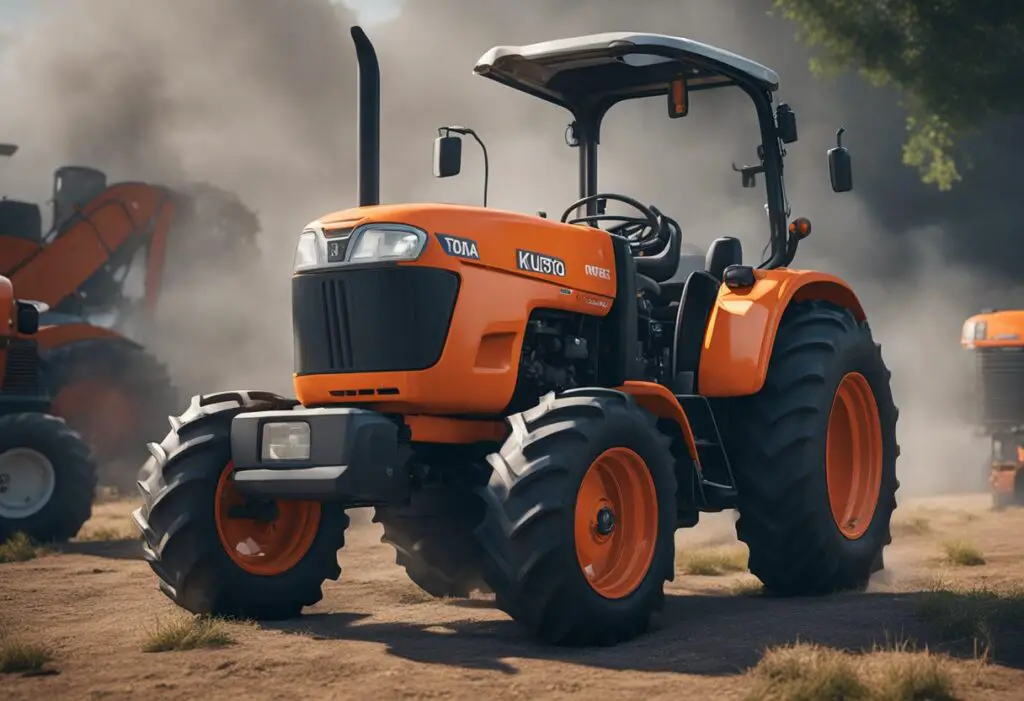
Maintenance and proper usage play a crucial role in the performance and reliability of your Kubota tractor. By understanding the mechanics and attending to regular service checks, many problems can be prevented. In situations where issues do arise, having a clear approach to troubleshooting common problems such as airflow blockages, filtration challenges, and fuel management can be immensely beneficial. Moreover, being aware of the services offered by Kubota dealers and qualified mechanics will help keep your tractor in optimal condition for years to come.
Quick navigation:
– Kubota Fuel Shut Off Solenoid Problems: Quick Fixes & Tips
– Kubota Hydrostatic Transmission Problems: Tips and Fixes
Key Takeaways
- Familiarizing yourself with common Kubota tractor issues ensures efficient troubleshooting.
- Regular maintenance and understanding tractor mechanics contribute to preventing problems.
- Kubota’s dealer network provides valuable services for repair and maintenance needs.
Understanding Kubota Tractor Mechanics
In managing your Kubota tractor, it’s vital to grasp the interplay between routine maintenance and your tractor’s overall performance. Knowledge of tractor mechanics and adherence to maintenance schedules ensures your machine runs smoothly.
Basics of Tractor Mechanics
Your Kubota tractor is a complex machine, with a heart that beats in the rhythm of a diesel engine. To keep it in prime condition, you must understand some basic components and their functions:
- Engine: The power source of your tractor, with specific oil and fuel requirements.
- Clutch: Facilitates the transfer of power from the engine to the drivetrain.
- Hydraulics: Powers various tractor functions, including the lift arms and power steering.
Essential Checks:
- Check engine oil level regularly; proper oil levels are necessary for lubricating engine components.
- Observe the cooling system to avoid engine overheating.
- Inspect hydraulic fluids to ensure smooth operation of lift arms and steering.
Maintenance Requirements
To maintain your tractor’s efficiency, a consistent maintenance routine is non-negotiable. Here’s what you should keep an eye on:
- Engine Oil Changes: Change the oil according to the manufacturer’s recommendations to prevent engine wear.
- Filter Replacements: Regularly replace air, fuel, and oil filters to keep contaminants out of your engine.
Maintenance Schedule Example:
| Maintenance Task | Frequency |
|---|---|
| Engine Oil Change | Every 100 hours |
| Air Filter Check | Every 50 hours |
| Fuel Filter Change | Every 200 hours |
Remember, your tracto’s manual is your best friend. It provides specific maintenance intervals and procedures tailored for your model. By understanding and applying tractor mechanics and upholding diligent maintenance, you help ensure your Kubota tractor operates at its best.
Common Mechanical Problems and Troubleshooting
In this section, you’ll find targeted advice to efficiently tackle some of the most common mechanical problems that might occur with your Kubota tractor, from overheating to fuel system complications and electrical issues.
Overheating Issues
When your Kubota tractor overheats, it’s often due to restricted airflow to the radiator or a malfunctioning cooling system. Ensure that the radiator is free from debris and that coolant levels are adequate. A clogged air filter can also cause overheating by restricting airflow to the engine. Regularly inspect and clean or replace the air filter to maintain proper engine temperature.
Fuel System Complications
Troubles with the fuel system can range from a clogged fuel filter to issues with the fuel pump or fuel lines. Here’s a quick checklist to troubleshoot fuel system problems:
- Fuel Tank: Make sure there’s enough fuel and that it’s clean, without contamination.
- Fuel Lines: Inspect for clogs or leaks and replace if damaged.
- Fuel Filter: Replace the fuel filter regularly to prevent blockages.
- Fuel Pump: Confirm that the pump is delivering fuel from the tank to the engine correctly.
Electrical Problems
Electrical troubles can leave you with an unresponsive tractor. The first place to check is your battery; ensure it’s fully charged and that the connections are clean and tight. Inspect the battery cables for any signs of wear or corrosion and replace them if necessary. Safety switches may prevent the engine from starting if they are engaged or faulty, so verify that these switches are in the correct position and functioning as they should.
Dealing with Airflow and Filter Challenges
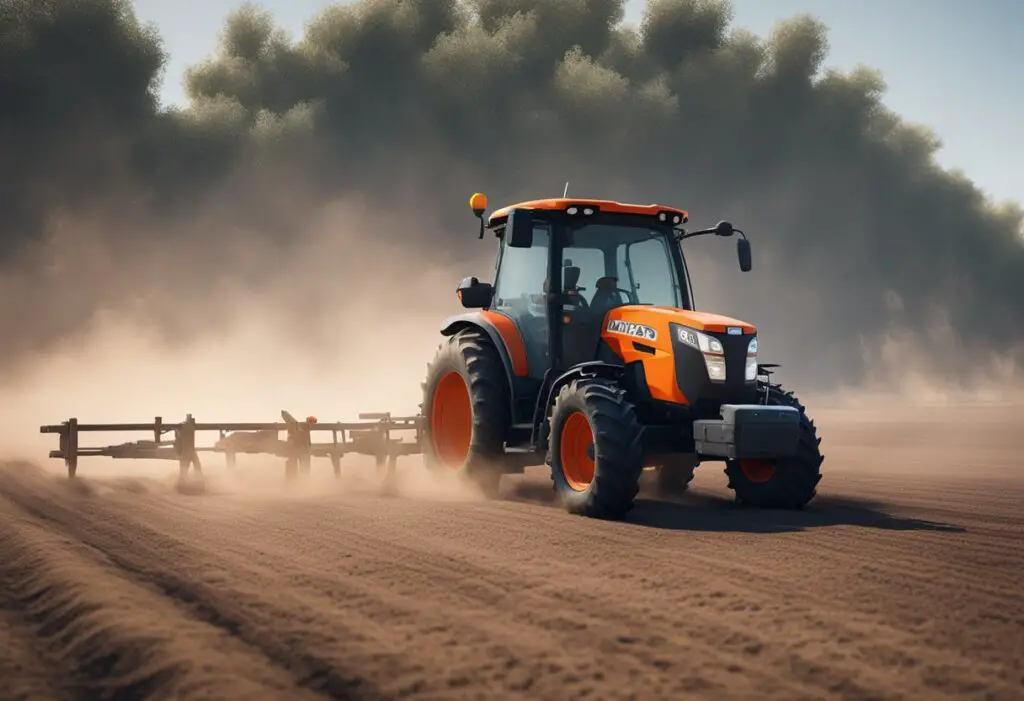
Ensuring your Kubota tractor runs efficiently involves regular maintenance of the air filter and staying vigilant for any airflow obstructions or damages to the system.
Air Filter Maintenance
Your Kubota tractor’s air filter is critical for maintaining a proper fuel-air mixture, crucial for optimal engine performance. Here’s a brief guide:
- Check the air filter regularly: Depending on your environment’s dust levels, inspection frequency can vary. A good rule is to inspect it every 50 hours of use.
- Clean or replace as needed: If the air filter is dirty, clean it according to the manufacturer’s instructions. If it’s beyond cleaning, replace it.
Obstructions and Damages
An unobstructed airflow ensures your tractor’s engine receives the right amount of air for combustion. Below are some specifics:
- Inspect the air intake and linkage: Ensure no foreign objects are blocking the air intake. Check the linkage for any signs of wear or damage.
- Regular checks: After each use of your tractor, take a moment to look for any obstructions or damages that might have occurred during operation.
Keep in mind these steps to address common airflow issues with your Kubota tractor, which will contribute to its longevity and performance.
Kubota Dealer and Mechanic Services
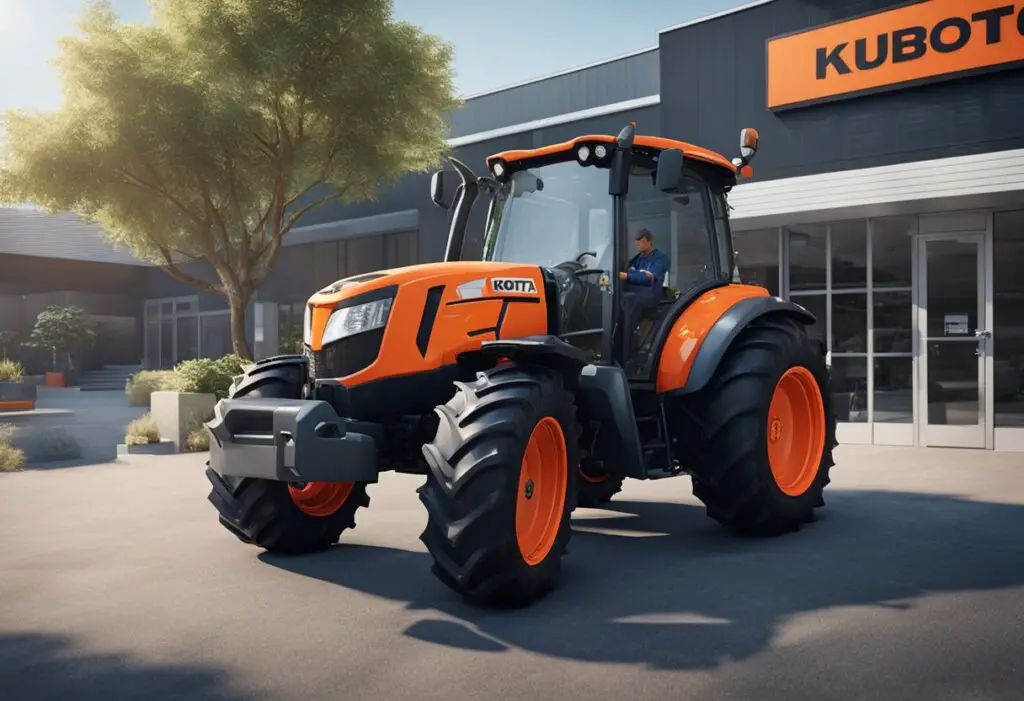
When it comes to maintaining your Kubota tractor, understanding when to seek out a dealer and the types of professional repair services available can save you time and prevent further complications. Your tractor’s performance and longevity hinge on the expertise and services provided by Kubota dealers and mechanics.
When to Visit a Dealer
You should visit your Kubota dealer for a diagnostic check or routine service if you are experiencing issues beyond basic maintenance. This is particularly important for complex problems where specialized knowledge of Kubota systems is necessary. Here’s an easy-to-follow list to help you determine when a dealer visit is your best option:
- Your tractor is not starting or showing signs of malfunction.
- You need professional advice on service and repair options.
- You’re in search of genuine Kubota parts for replacements.
- You want to ensure your tractor’s repairs fall under warranty provisions.
- There is a recall or service bulletin issued for your Kubota model.
Professional Repair Services
Kubota dealers offer a breadth of services employing certified mechanics who are trained to handle a wide array of repairs. These services include, but are not limited to:
- Timely and Accurate Diagnoses: Early detection of issues can prevent further damage.
- System-Specific Repairs: Such as hydraulic problems, where symptoms might include low brake pressure or weak lift capacity.
- Maintenance and Tune-Ups: To enhance performance and prolong lifespan.
When choosing professional repair services, always opt for certified Kubota dealers to ensure the highest quality of care for your equipment. Not only do they have access to the latest diagnostic equipment, but they also use Kubota-approved parts for any replacements needed, ensuring that your tractor operates as intended.
Preventative Practices for a Healthy Tractor
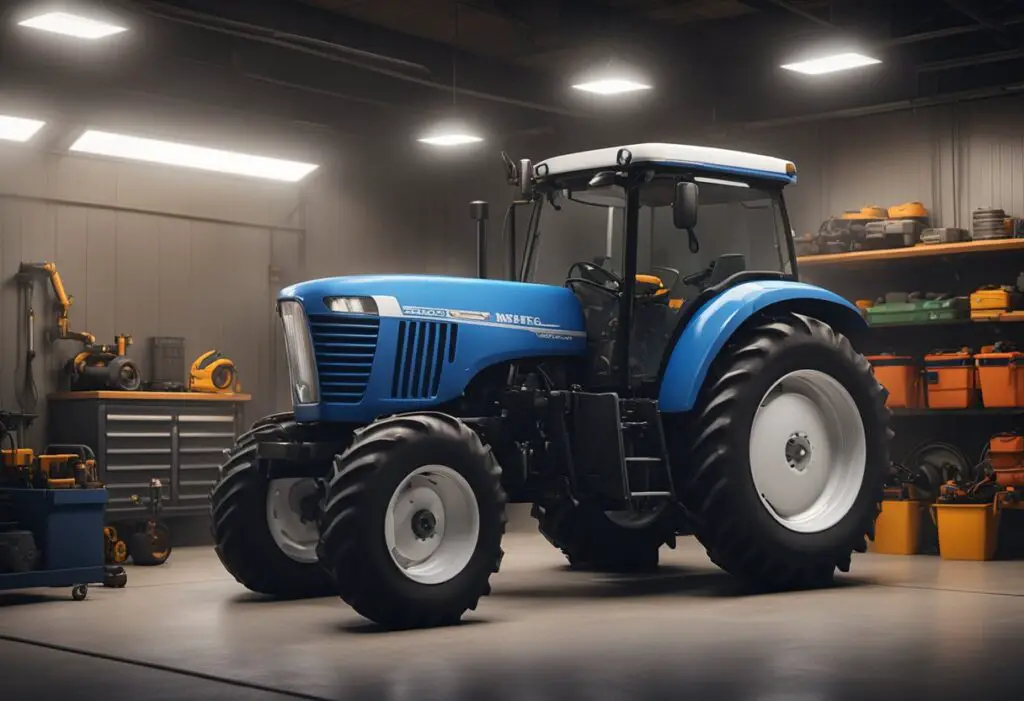
To ensure your Kubota tractor is running smoothly and to prevent issues, consistent maintenance is vital. By performing routine check-ups, you can catch small problems before they escalate.
Routine Check-ups
Check Fluid Levels: Make sure to regularly check your tractor’s fluid levels, including engine oil, transmission fluid, and coolant. If necessary, top them off or change them according to the manufacturer’s recommendations.
Fluid TypeCheck FrequencyNotesEngine OilEvery 50 hoursChange oil every 100-200 hours.Transmission FluidCheck monthlyRefer to the operator’s manual.CoolantBefore each useReplace annually or as needed. Air Filter Inspection: Clean and replace the air filter periodically to prevent debris from entering the engine and causing damage.
Tire Pressure: Keep the tires inflated to the proper pressure to ensure optimal performance and reduce wear.
Battery Maintenance: Clean the battery terminals and check the charge to avoid starting issues.
Regular Cleaning: After use, clean your tractor to remove mud, plant matter, or other debris that can lead to rust or mechanical issues.
Grease and Lubrication: Lubricate all moving parts regularly to reduce friction and wear.
By keeping up with these practices, you can help maintain the health and longevity of your Kubota tractor. Regular maintenance not only prevents costly repairs but also ensures your tractor is ready for work when you need it.
Fuel Handling and Storage
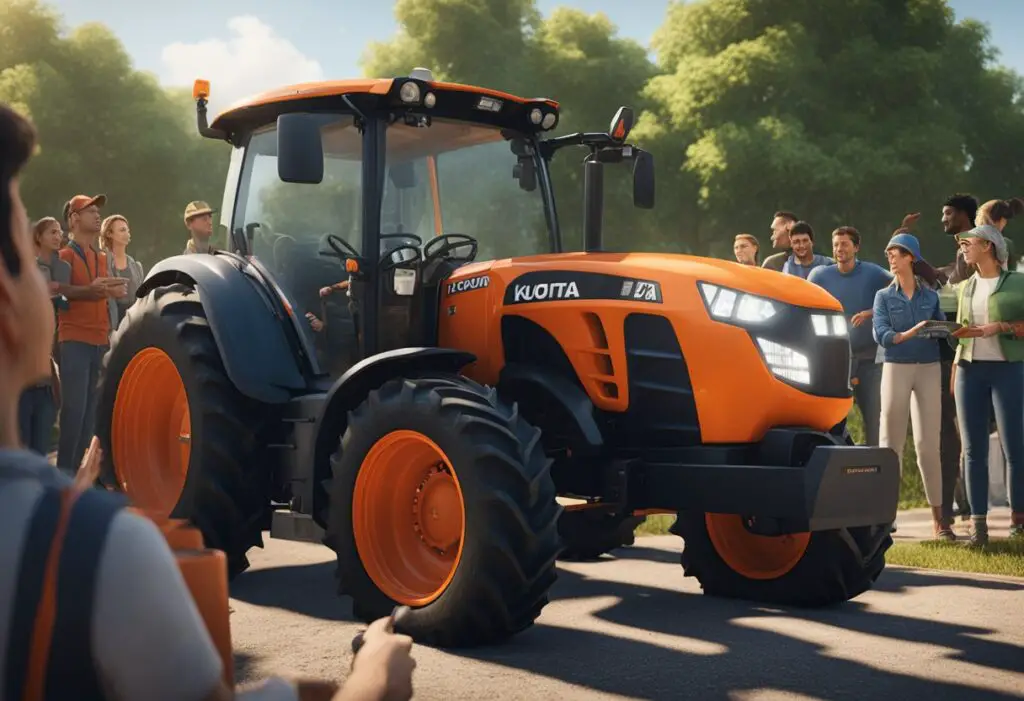
Maintaining your Kubota tractor requires careful attention to fuel handling and storage. Proper management ensures that fuel remains clean and contaminants-free, while focused care for gas and diesel can significantly improve the longevity and performance of your machine.
Proper Fuel Management
To ensure your fuel supply is always ready for your tractor’s fuel pump and engine, check your fuel lines and fuel tank regularly for leaks. If you store fuel long-term, a clean, sealed container away from direct sunlight will protect it from degradation. Here’s a simple checklist for your fuel system checks:
- Inspect fuel lines and connections for signs of wear or damage.
- Monitor the fuel tank for cleanliness and seal integrity to avoid contamination.
- Replace the fuel filter regularly to avoid clogs that can restrict fuel supply.
Gas and Diesel Care
Different precautions are necessary for gas and diesel to keep your Kubota running smoothly. Diesel is more prone to water contamination and gelling in cold weather, so it’s crucial to store it properly.
- Store diesel in an appropriate container, such as a 55 gallon poly drum, to keep it clean and dry.
- Use a manual pump for easier handling and to reduce spillage risks.
- Keep an eye on the condition of your tractor’s fuel filter, as dirt or slime can lead to blockages, affecting the tractor’s performance.
Remember, regular maintenance of the fuel components not only aids in the seamless functioning of your Kubota tractor but also helps in extending its life span.
Frequently Asked Questions
If you’re a Kubota tractor owner, you might have questions about maintaining optimal performance and resolving common issues. In this section, we cover frequently asked questions that cater to some typical challenges you may encounter.
How do I troubleshoot loader performance issues on my Kubota tractor?
Loader performance problems in Kubota tractors can often be attributed to hydraulic issues. Check your hydraulic fluid levels and look for any leaks in the system. Regular maintenance of the hydraulic system can help prevent these issues.
What common injector problems can occur with Kubota tractors?
Kubota tractors sometimes experience injector problems such as clogging or wear. Symptoms include engine misfires, reduced power, and fuel inefficiency. Injector issues often require professional cleaning or replacement.
How can I resolve engine difficulties in my Kubota tractor?
Engine difficulties can stem from a variety of issues including a dirty air filter, stale fuel, or a malfunctioning spark plug. For a non-starting engine, make sure to check the basics such as the fuel level, air intake, and spark plug condition.
What are some known issues with Kubota 3 cylinder diesel engines?
Common issues with Kubota’s 3 cylinder diesel engines involve overheating, starting problems, and irregular running. Overheating may be caused by a clogged radiator, whereas starting problems could be related to battery health or starter motor issues.
How does the reliability of Kubota tractors compare to John Deere?
Kubota tractors are generally known for their reliability and durability, similar to John Deere. The choice often comes down to personal preference, specific model features, and the type of support available from the manufacturer and dealers.
What is the expected lifespan in hours for a Kubota tractor?
A well-maintained Kubota tractor can last for several thousand hours of operation. Lifespan can vary based on usage intensity and maintenance practices, but with proper care, Kubota tractors can serve reliably for many years.
Leave a Reply